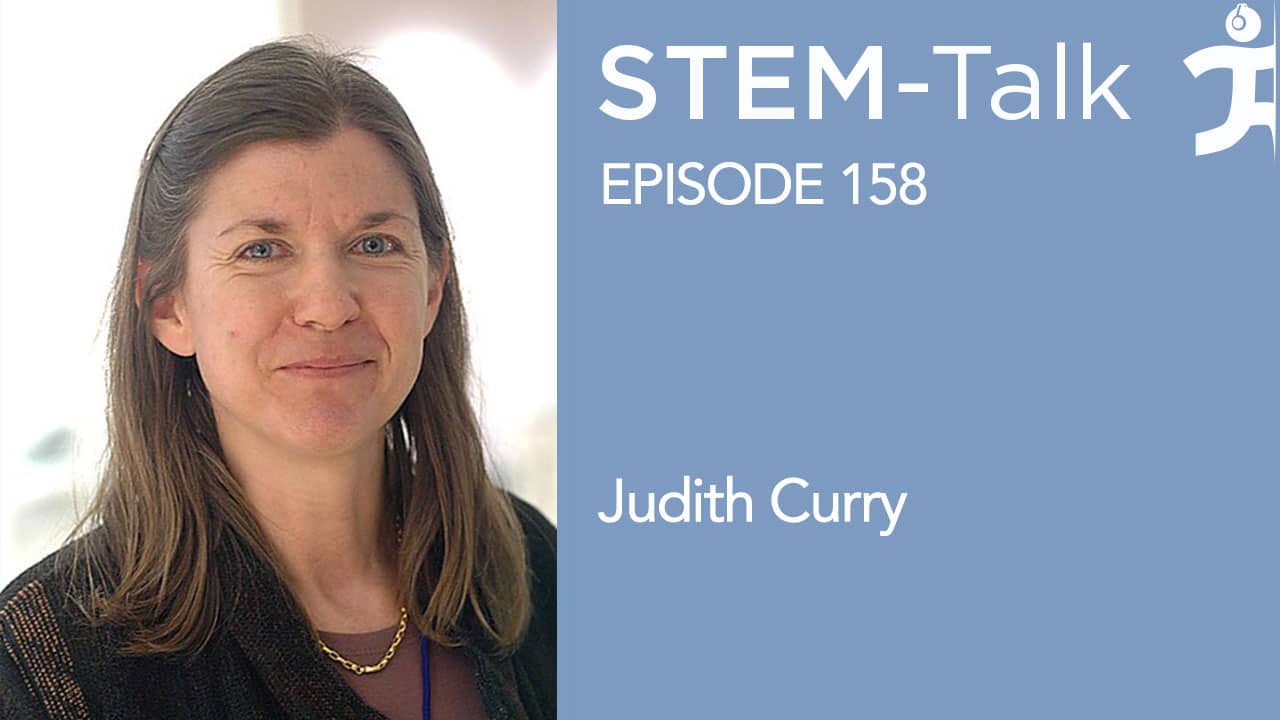STEM-Talk
Episode 158: Judith Curry talks about the uncertainties of climate change
// Oct 4, 2023

Today we have climatologist Dr. Judith Curry, Professor Emerita of Earth and Atmospheric Sciences at the Georgia Institute of Technology. Judy also is president of the Climate Forecast Application Network and the host of the blog, Climate Etc, which you can find at JudithCurry.com. Judy’s blog provides a forum for climate researchers, academics and technical experts from other fields as well as citizen scientists to discuss topics related to climate science and policy.
Judy’s research interests include hurricanes, remote sensing, atmospheric modeling, polar climates, air-sea interactions, climate models, and the use of unmanned aerial vehicles for atmospheric research. She was a member of the National Research Council’s Climate Research Committee, and has published more than 180 scientific papers.
Judy has become known in scientific circles as a contrarian for pointing out the uncertainties and deficiencies of climate modeling. In 2017, she resigned from her tenured position at Georgia Tech partly because of the poisonous nature of the scientific discussion around human-caused global warming.
Our interview with Judy follows the release of her book “Climate Change and Uncertainty: Rethinking our Response.” The book provides a framework for understanding and rethinking the climate-change debate. The book also offers a new way to think about climate change and the risks we are facing as well as the way we go about responding to it.
Show notes:
[00:03:44] To start the interview, Morley asks Judy what she was like as a kid. [00:04:08] Morley says he understands that Judy’s interest in science had a lot to do with a geologist who came to speak to Judy and her fifth-grade classmates. [00:05:06] Morley asks if it is true that directly after that talk, Judy went to the bookstore and bought a geology picture book. [00:05:39] Judy talks about her undergraduate education at Northern Illinois University and why she decided to major in geography. [00:06:08] Morley asks about Judy’s brief time at Colorado State University, which lasted just one quarter. [00:06:45] Morley mentions that for Judy’s Ph.D. thesis at the University of Chicago, she decided to research the role of radiative transfer on arctic weather. Morley asks if her decision to study the arctic atmosphere and sea ice turned out to be fortuitous. [00:07:35] Ken brings up the media consensus of the ‘70s and ‘80s about how the Earth was headed toward a new ice age because of air pollution blocking the sun. Ken mentions that climate is an incredibly complex system. He wonders if it were irresponsible for the media to proclaim certainty on such topics as a new approaching ice age, which we now know didn’t happen. Ken asks Judy to weigh in. [00:10:48] Morley asks about a 1997 arctic expedition that Judy and her colleagues went on called SHEBA, or Surface Heat Budget of the Arctic Ocean, which aimed to document feedback among the atmosphere, sea ice, and the ocean. Judy talks about how the expedition sought to address discrepancies between observations and climate models. [00:12:14] Ken explains that the hurricane season of 2004 was a pivotal time, with 14 named storms in the North Atlantic, nine of which became hurricanes. Ken asks Judy about the influence that hurricane season had on her. [00:14:21] Ken mentions that a hurricane paper Judy published in 2005 attracted a lot of attention, with numerous fellow climatologists as well as the media championing her analysis that showed a doubling of Category 4 and 5 hurricanes since 1970. Ken goes on to note, however, that there were also some scathing critiques of her paper, particularly with respect to the hurricane data that the analysis relied on. Ken asks Judy to talk about how she engaged with her critics and what transpired. [00:16:42] Morley asks Judy about how she became a vocal supporter of the IPCC and the concerns it was raising following the 2004 hurricane season. [00:18:02] Ken follows up and asks Judy if she still believes that the warming the Earth has experienced has caused a spike in intense hurricanes. [00:18:37] Ken asks Judy about the unauthorized release of emails from the Climactic Research Unit at the University of East Anglia, otherwise known as “climategate.” The emails showed that some researchers were manipulating data to make it seem that he earth was heating up dangerously. [00:20:45] Morley asks Judy to give a primer on climate modeling and how complex it is. [00:22:09] Morley mentions that in her book, “Climate Uncertainty and Risk: Rethinking Our Response,” Judy discusses several incontrovertible facts about global warming. Morley asks Judy to list them for the listeners. [00:22:50] Morley mentions that Judy argues in her book that these facts about climate change do not tell us much about the most consequential issues associated with climate change. Morley goes on to mention that Judy’s book highlights four key arguments in regards to global warming. Her first argument is that we do not definitively know to what extent CO2 and other human-caused emissions have dominated natural climate variability as the cause of recent warming. Morley asks Judy to elaborate on this. [00:23:49] Morley asks Judy to explain her second argument, which is that we don’t have a good handle on how much the climate can be expected to change over the course of the 21st Century. [00:24:41] Ken explains that Judy’s third argument is that there is not agreement on whether warming is actually dangerous, and that the notion of danger is based on societal values on which science has little to nothing to say. Ken asks Judy to talk about these claims. [00:26:00] Ken asks Judy about her final argument, which is that there is widespread disagreement about whether radically reducing emissions will improve human wellbeing in the 21st Century. [00:27:29] Morley explains that Judy pointed out many of these issues in 2013 during testimony she gave to a house committee after President Obama’s United Nations climate pledge. Judy argued at the time that the climate community had been working on building a scientific consensus on anthropogenic climate change for 20 years, and that she believed this consensus building process perhaps had the unintended consequence of oversimplifying the climate change problem and its solution. Morley asks Judy to expand on this. [00:30:41] Morley explains that Judy mentioned on NPR’s show “All Things Considered” that she takes multiple steps to reduce her carbon footprint. Morley asks when she decided to implement those steps and why. [00:31:51] Morley explains that Judy once said in an interview that even if we achieved net zero with our carbon footprint, we would barely notice. Morley goes on to say that people hold up the pre-industrial era as a “golden age” for the climate, and asks Judy what her thoughts are on this. [00:32:50] Ken asks Judy to elaborate on her stance that there is no climate change emergency. Ken mentions that Judy’s stance has led to her being labeled a contrarian and dissident climatologist. [00:34:21] Ken explains that Judy resigned from her tenured position in 2017 due to a variety of factors, including not knowing how to advise students and postdocs on how to navigate the “craziness of the field of climate science.” Ken asks if this was a difficult decision for Judy. [00:35:44] Morley explains that in a post about her resignation, Judy wrote: “Once you detach from the academic mindset, publishing on the internet makes much more sense, and the peer review you can get on a technical blog is much more extensive. But peer review is not really the point; provoking people to think in new ways about something is really the point. In other words, science is a process, rather than a collection of decreed ‘truths.’” Morley asks Judy to expand on this perspective. [00:37:31] Morley explains that there has been a lot of publicity regarding the recent extreme weather events over the past few years, with some climatologists arguing that these events are evidence that we are in the midst of an emergency. He asks Judy for her take. [00:39:04] Morley mentions that Judy frequently argues that policy makers haven’t thought through climate change. While climate change is real, and has negative impacts, Judy argues that common portrayals of a crisis are unfounded. Morley goes on to mention a 2020 paper by Bjorn Lomborg in which he points out that under scenarios set out under the IPPCC, human welfare is likely to increase by 450 percent by the end of the 21st Century. Lomborg estimates climate damages will modestly reduce this welfare increase to 434 percent. Morley explains that Judy’s argument is that policymakers could screw up this upward trajectory in welfare if they destroy our current energy infrastructure. He asks Judy to expand on this. [00:41:37] Ken asks Judy to talk about how transitioning to all wind and solar power would require a large expenditure of fossil fuel. [00:44:13] Morley asks if it is true that Judy believes that instead of trying to reach zero carbon emissions by 2025, or some other date, that we should invest in increasing our resilience to extreme weather events. [00:45:05] Morley pivots to talk about Judy’s book, “Climate Uncertainty and Risk” which Judy began writing in 2020. [00:45:58] Morley asks Judy when and why she started her blog “Climate Etc.,” and how it helped her in preparation for her book. [00:46:31] Ken explains that Judy’s book is very ambitious and sets out to show how the narrow and politicized framing of the climate debate has resulted in an oversimplification of both the scientific problem and its solutions. Ken asks if it is true that the book is not just about the climate debate but also, in more broad terms, about uncertainty and risk. [00:48:00] Morley asks Judy about the second part of her book, specifically the chapter titled “The Climate Change Uncertainty Monster,” which highlights the problems we face in terms of climate change. [00:49:03] Morley mentions that there is a section in Judy’s book titled “Emissions and Temperature Targets.” She begins the chapter with a quote from environmental scientist John Foley: “The first rule of climate chess is this: The board is bigger than we think, and includes more than fossil fuels.” Morley asks Judy what else the board includes. [00:49:41] Morley asks about a paper that Judy referenced towards the end of her book in laying out scenarios for a way forward with climate change, “Usable Climate Science Is Adaption Science,” in which Adam Sobel of Columbia University writes that in the present historical moment, the only climate science that is truly usable is that which is oriented toward adaptation. He argues that current policies and politics are so far removed from what we need to do to avert dangerous climate change that scientific uncertainty is not a limiting factor on mitigation. [00:51:32] Morley asks about another paper that Judy references in her book titled “Small Is Beautiful: Climate-Change Science as if People Mattered.” Written by Regina Rodrigues of Brazil’s Department of Meteorology and Theodore Shepherd of the University of Reading in the UK, it describes how there is a widely accepted gap between the production and use of climate information. The authors call for a break with traditional climate research and methodology, which at the moment seems to be very top-down driven. Morley asks Judy to talk about the proposal for a more bottom-up approach. [00:52:26] Ken pivots to ask Judy about the term “wicked science,” which she refers to in the last chapter of her book. The chapter is titled “Wicked Science for Wicked Times.” [00:53:58] Morley asks Judy how she spends her time now that she has resigned from Georgia Tech and academic life.Links:






